
KOREAN JOURNAL OF CHEMICAL ENGINEERING
Scope & Guideline
Elevating Knowledge in Chemical Engineering.
Introduction
Aims and Scopes
- Chemical Process Engineering:
Research focused on the design, optimization, and modeling of chemical processes, including reaction engineering, separation processes, and heat transfer. - Materials Science and Engineering:
Studies on the synthesis, characterization, and applications of advanced materials, including nanomaterials, polymers, and composites, emphasizing their engineering properties. - Environmental Engineering and Sustainability:
Research addressing environmental challenges through innovative solutions such as waste treatment, pollution control, and sustainable resource management. - Energy and Fuel Technologies:
Development of technologies related to energy production, conversion, and storage, including biofuels, hydrogen production, and battery technologies. - Biochemical Engineering:
Exploration of bioprocesses, including microbial and enzymatic systems, for applications in biotechnology, pharmaceuticals, and biofuels. - Computational Methods and Machine Learning:
Application of computational techniques, simulations, and machine learning approaches for solving complex chemical engineering problems.
Trending and Emerging
- Sustainable and Green Chemistry:
There is a growing emphasis on sustainable practices in chemical engineering, including green synthesis, waste valorization, and eco-friendly processes. - Advanced Materials for Energy Applications:
Research on materials such as nanocomposites and metal-organic frameworks (MOFs) for energy storage and conversion technologies is rapidly increasing. - Machine Learning and AI in Chemical Engineering:
The integration of machine learning and AI for process optimization, predictive modeling, and data analysis is becoming a significant area of interest. - Carbon Capture and Utilization Technologies:
Research focused on CO2 capture, utilization, and conversion technologies is trending as the industry seeks solutions to combat climate change. - Biotechnology and Bioprocessing Advances:
Innovations in bioprocess engineering, including metabolic engineering and synthetic biology, are emerging as critical areas of research. - Nanotechnology and Nanomaterials:
The application of nanotechnology in various fields, including catalysis, drug delivery, and environmental remediation, is increasingly prominent.
Declining or Waning
- Traditional Chemical Synthesis Methods:
There is a noticeable decline in research focused solely on traditional chemical synthesis methods, as newer, more efficient, and sustainable alternatives are gaining traction. - Conventional Wastewater Treatment Techniques:
Research on conventional wastewater treatment methods is decreasing as innovative, eco-friendly, and efficient technologies are being prioritized. - Static Process Modeling:
Static modeling approaches are becoming less common as dynamic and real-time modeling techniques gain popularity in process optimization. - Single-Use Materials in Processes:
The focus on single-use materials is waning due to increasing environmental concerns, leading to a rise in studies around sustainable and reusable materials.
Similar Journals
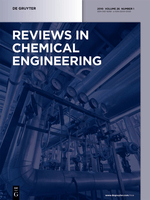
REVIEWS IN CHEMICAL ENGINEERING
Pioneering Insights for Tomorrow's Technologies.REVIEWS IN CHEMICAL ENGINEERING, published by Walter de Gruyter GmbH, is a premier journal that delivers cutting-edge insights and comprehensive reviews in the field of chemical engineering. Established as an eminent resource since 1982, this journal is committed to advancing knowledge and fostering innovation in various domains of chemical engineering, including process design, materials, and environmental considerations. With an impressive Q1 ranking in the 2023 Scopus category for Chemical Engineering and a commendable 20th position out of 273 journals, it is recognized for its rigorous peer-review process and high-impact contributions. Although it operates under a subscription model, the journal remains a vital platform for researchers and professionals aiming to stay at the forefront of technological advancements and scholarly discourse in chemical engineering. With a focus on interdisciplinary applications and real-world relevance, REVIEWS IN CHEMICAL ENGINEERING is an indispensable resource for academics, industry professionals, and students dedicated to excellence in this field.

Frontiers in Chemical Engineering
Fostering Collaboration for a Sustainable FutureFrontiers in Chemical Engineering is an esteemed open-access journal published by Frontiers Media SA, dedicated to advancing knowledge in the dynamic field of chemical engineering. Since its inception in 2019, this journal has rapidly gained recognition for its rigorous peer-reviewed articles and innovative research contributions, achieving notable quartile rankings such as Q2 in Chemical Engineering and Q3 in both Bioengineering and Catalysis by 2023. With an emphasis on providing accessible and cutting-edge research, the journal caters to a diverse audience of researchers, professionals, and students interested in the latest developments and methodologies within the chemical engineering discipline. Hailing from Lausanne, Switzerland, Frontiers in Chemical Engineering embodies a commitment to enhancing collaborative scientific communication, making crucial research findings available without barrier. By publishing high-quality articles that address both theoretical advancements and practical applications in chemical engineering, this journal serves as a pivotal resource for fostering innovation and collaboration across the global research community.

International Journal of Chemical Engineering
Exploring the frontiers of chemical engineering knowledge.International Journal of Chemical Engineering is a leading peer-reviewed journal published by HINDAWI LTD, dedicated to advancing the field of chemical engineering through innovative research and practical applications. With an impact factor that places it in the Q2 category of Chemical Engineering (miscellaneous), this journal has established itself as a significant resource for researchers and professionals alike, particularly those interested in general chemical engineering topics. Since its transition to Open Access in 2008, the journal has ensured that critical scientific knowledge remains accessible to a global audience, fostering collaboration and interdisciplinary research. With coverage from 2009 to 2024, it continues to be an essential platform for disseminating cutting-edge findings, methodologies, and discussions that shape the future of chemical engineering. For more information, visit their website or access the latest issue directly to explore groundbreaking studies and insights.
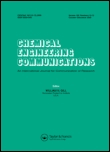
CHEMICAL ENGINEERING COMMUNICATIONS
Fostering Collaboration in Chemical Engineering Excellence.Chemical Engineering Communications, published by Taylor & Francis Inc, is a distinguished journal within the realms of Chemical Engineering and Chemistry. With an ISSN of 0098-6445, this journal plays a pivotal role in disseminating innovative research, critical reviews, and insightful discussions that encompass a broad spectrum of topics in these fields. The journal boasts a commendable Q2 ranking in the 2023 category of chemical engineering and general chemistry, reflecting its significant contribution to the scientific community. Operating under a rigorous peer-review process, the journal attracts high-quality submissions from global researchers. Although currently not an Open Access journal, it provides extensive archive access for users interested in exploring past advancements from its inception in 1973 through to 2024. With a commitment to advancing knowledge and fostering collaboration among academia and industry, Chemical Engineering Communications remains an essential resource for professionals and students aiming to stay abreast of the latest developments in chemical sciences.
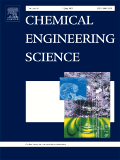
CHEMICAL ENGINEERING SCIENCE
Catalyzing Breakthroughs in Industrial and Manufacturing EngineeringChemical Engineering Science is an esteemed journal published by Pergamon-Elsevier Science Ltd, dedicated to advancing the field of chemical engineering through high-quality research and innovation. With a storied history spanning from 1951 to 2025, this journal is recognized as a leading platform for disseminating cutting-edge studies, encompassing a diverse range of topics within chemical engineering, applied mathematics, and industrial engineering. Notably, it holds a prestigious Q1 ranking in several categories, including Chemical Engineering and Industrial and Manufacturing Engineering, indicating its significant impact and influence in these fields. The journal is not open access, yet it maintains a robust readership and is widely cited in academic circles, reflecting its vital role in shaping modern engineering practices. As a vital resource for researchers, professionals, and students alike, Chemical Engineering Science continues to bridge theoretical concepts and practical applications, fostering a deeper understanding of the complex challenges in chemical processes and manufacturing.

Green Chemical Engineering
Pioneering research at the intersection of chemistry and ecology.Green Chemical Engineering, an esteemed journal published by KEAI PUBLISHING LTD, plays a pivotal role in advancing the field of sustainable chemical engineering. With an Open Access policy since 2020, this journal facilitates the free exchange of cutting-edge research and innovations that address critical environmental challenges. Based in China, it has rapidly gained recognition with impressive category quartiles, ranking Q1 in numerous relevant fields including Catalysis, Chemical Engineering (miscellaneous), Filtration and Separation, and Process Chemistry and Technology. Its presence in Scopus highlights its significance, with top rankings (e.g., Rank #4/19 in Filtration and Separation) placing it in the upper echelons of chemical engineering literature. Designed for researchers, professionals, and students alike, Green Chemical Engineering aims to foster a collaborative platform for the dissemination of pioneering work that contributes to a greener and more sustainable future.

Frontiers of Chemical Science and Engineering
Driving Breakthroughs in Environmental SustainabilityFrontiers of Chemical Science and Engineering is an esteemed journal published by SPRINGER, dedicated to advancing the rapidly evolving domain of chemical engineering. Located in New York, USA, this journal provides a vibrant platform for disseminating groundbreaking research and innovative methodologies in the field. With an impressive Q1 ranking in Chemical Engineering and a Scopus ranking of 54 out of 273, it occupies a prominent position, reflecting its high impact and relevance among academic circles. Since its inception in 2011, it has fostered interdisciplinary collaboration, encompassing diverse topics such as process engineering, environmental sustainability, and nanotechnology, making it a vital resource for researchers, professionals, and students alike. The journal's open access policy further enhances accessibility, ensuring that cutting-edge research is readily available to a global audience. As the field continues to evolve, contributions to Frontiers of Chemical Science and Engineering play an essential role in shaping future advancements and empowering the next generation of engineers.
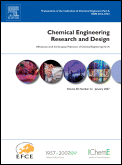
CHEMICAL ENGINEERING RESEARCH & DESIGN
Unveiling New Horizons in Chemical Engineering.CHEMICAL ENGINEERING RESEARCH & DESIGN is a prestigious journal that has been at the forefront of dissemination in the fields of chemical engineering and general chemistry since its inception in 1983. Published by Elsevier, the journal features a rich array of research articles that contribute to both theoretical and practical advancements in the discipline. With an impact factor that positions it strongly within the Q2 quartile for both Chemical Engineering and Chemistry categories, it occupies an esteemed place in the academic community, being ranked #77 out of 273 in Chemical Engineering and #111 out of 408 in General Chemistry on Scopus. Researchers and professionals will find it an invaluable resource for cutting-edge research and innovative methodologies that shape the future of chemical engineering applications. While the journal does not currently offer open access, it remains accessible through institutional subscriptions, ensuring that important findings continue to reach a broad audience. With a scope that is poised to expand through 2024, the journal aims to foster collaboration and knowledge sharing, supporting the continuous evolution of the field.
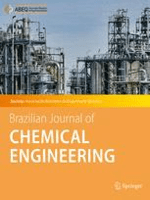
BRAZILIAN JOURNAL OF CHEMICAL ENGINEERING
Innovating Solutions for a Sustainable FutureThe Brazilian Journal of Chemical Engineering (ISSN: 0104-6632, E-ISSN: 1678-4383), published by Springer Heidelberg, stands as a prominent open-access journal dedicated to disseminating innovative research and advancements in chemical engineering since its inception in 1997. With a commitment to enhancing knowledge exchange within the field, this journal is indexed in Scopus, earning a respectable Q3 rank in the category of General Chemical Engineering as of 2023. It provides a platform for researchers, professionals, and students to explore a diverse range of topics, fostering collaboration and innovation from its base in Brazil. The journal has converged its operations from 1995 and will continue to push the boundaries of chemical engineering research until 2024 and beyond. As a critical resource for up-to-date methodologies and emerging trends, the Brazilian Journal of Chemical Engineering is essential for those aiming to make impactful contributions in this dynamic and evolving field.
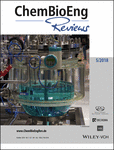
ChemBioEng Reviews
Transforming Ideas into Bioengineered SolutionsChemBioEng Reviews is a premier academic journal dedicated to advancing the fields of biochemistry, bioengineering, and chemical engineering. Published by WILEY-V C H VERLAG GMBH, this journal serves as an essential platform for researchers and professionals seeking to disseminate groundbreaking insights and innovations. With a remarkable impact factor and a solid reputation, it is ranked in the top quartile (Q1) across multiple disciplines, including Biochemistry, Bioengineering, and Industrial and Manufacturing Engineering. The journal's comprehensive scope covers the synthesis, analysis, and application of bioengineered solutions, making it a vital resource for anyone involved in process chemistry and technology. With an unwavering commitment to high-quality scientific discourse from 2014 to 2024, ChemBioEng Reviews is not only pivotal for the academic community but also contributes to industry advancements in filtration, separation processes, and the intersection of chemical and biological engineering.